HNC Business Unit 4: Management & Operations Report Analysis
VerifiedAdded on 2021/02/19
|14
|3717
|39
Report
AI Summary
This report provides a comprehensive analysis of management and operations within the context of a retail organization, MANGO. It begins by defining the roles and characteristics of both managers and leaders, highlighting their responsibilities in areas such as recruitment, training, and organizational representation. The report then delves into the differences between leadership and management, emphasizing their distinct functions within an organizational structure. Furthermore, it explores situational scenarios and the roles of leaders and managers in addressing challenges like project execution and employee turnover. The report also examines various leadership theories, including situational, system, and contingency leadership, and their application in decision-making processes. Finally, it discusses operational management approaches such as Total Quality Management (TQM) and Just-in-Time strategies, and their significance in achieving organizational goals, emphasizing the importance of these concepts for the growth and success of a business.
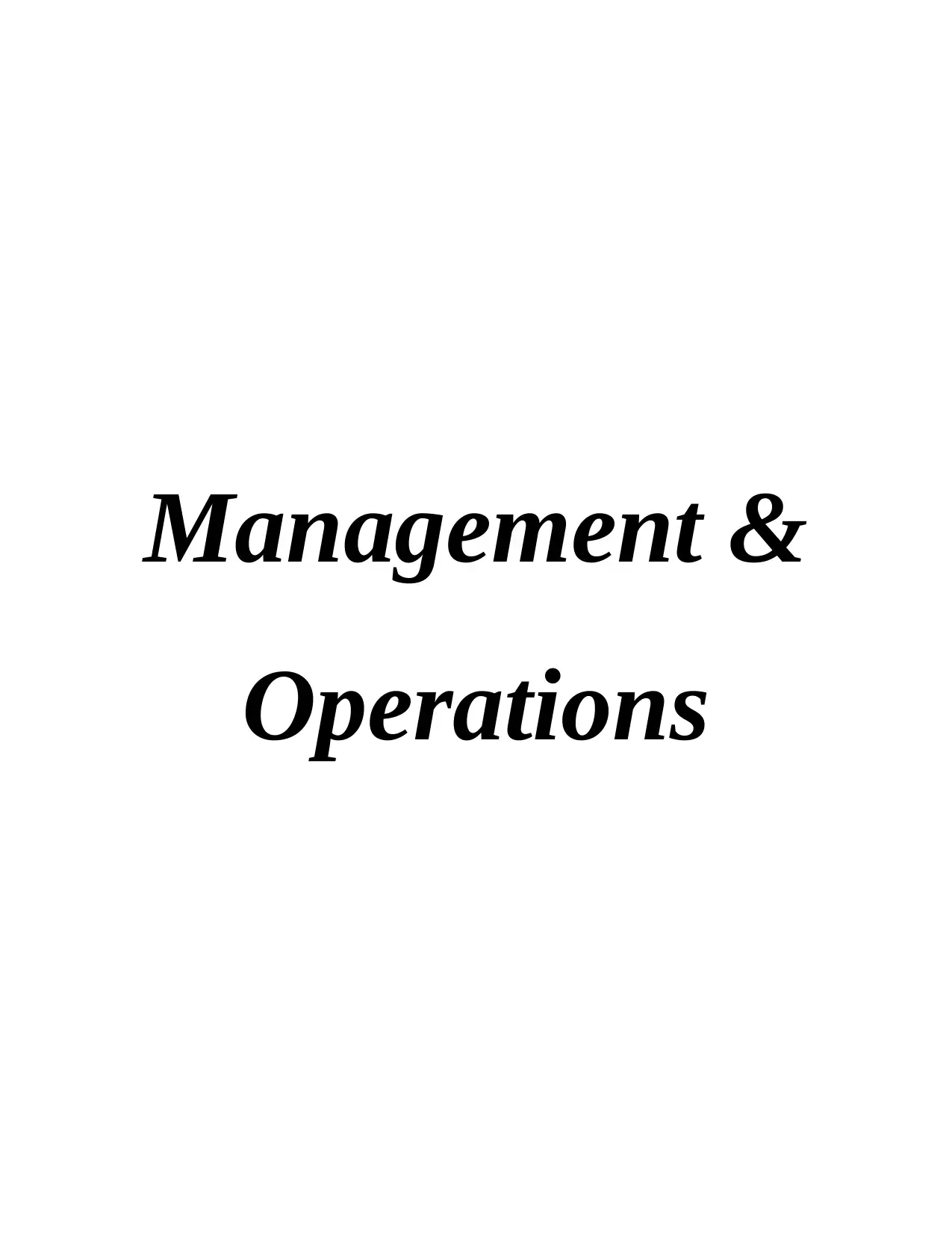
Management &
Operations
Operations
Paraphrase This Document
Need a fresh take? Get an instant paraphrase of this document with our AI Paraphraser
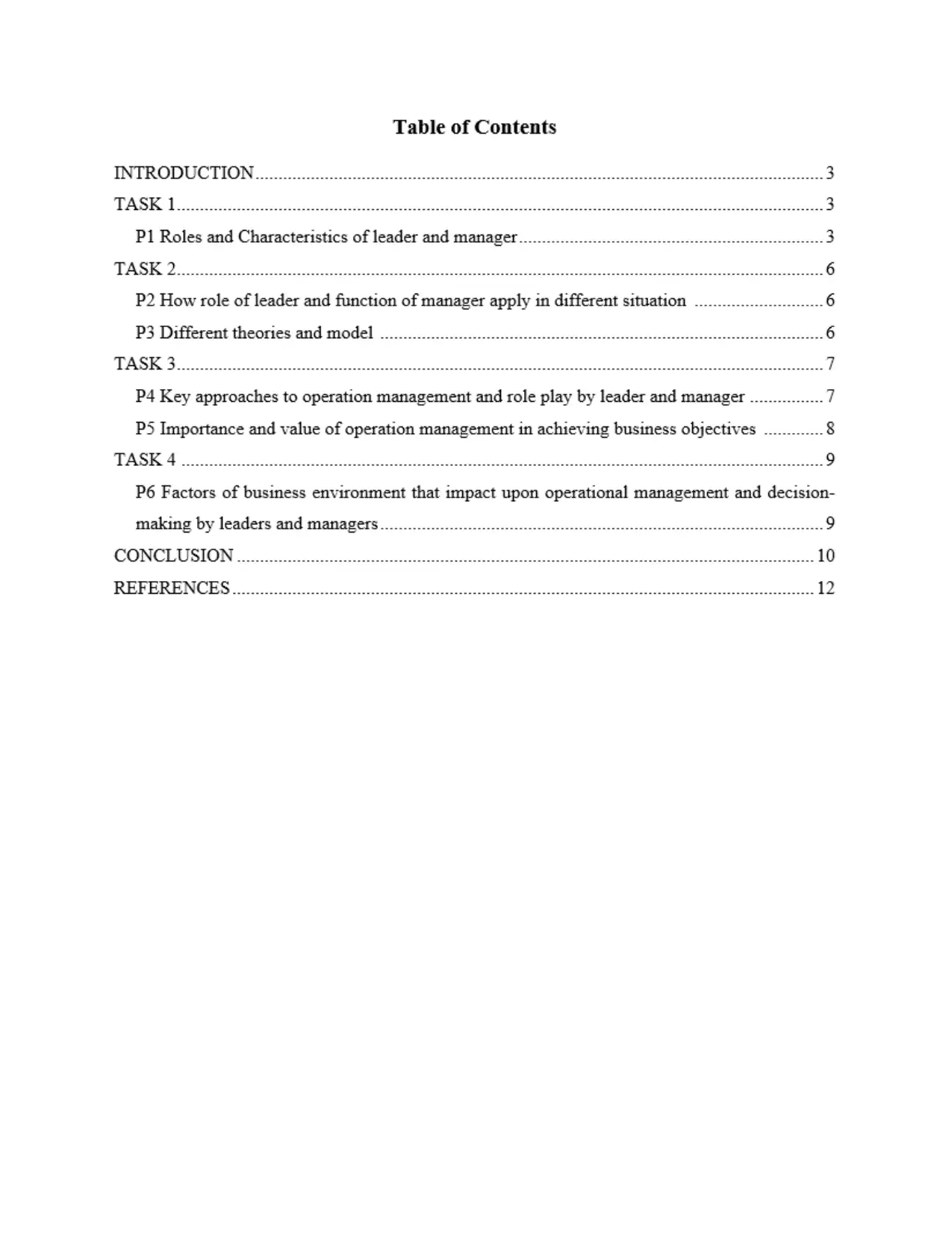
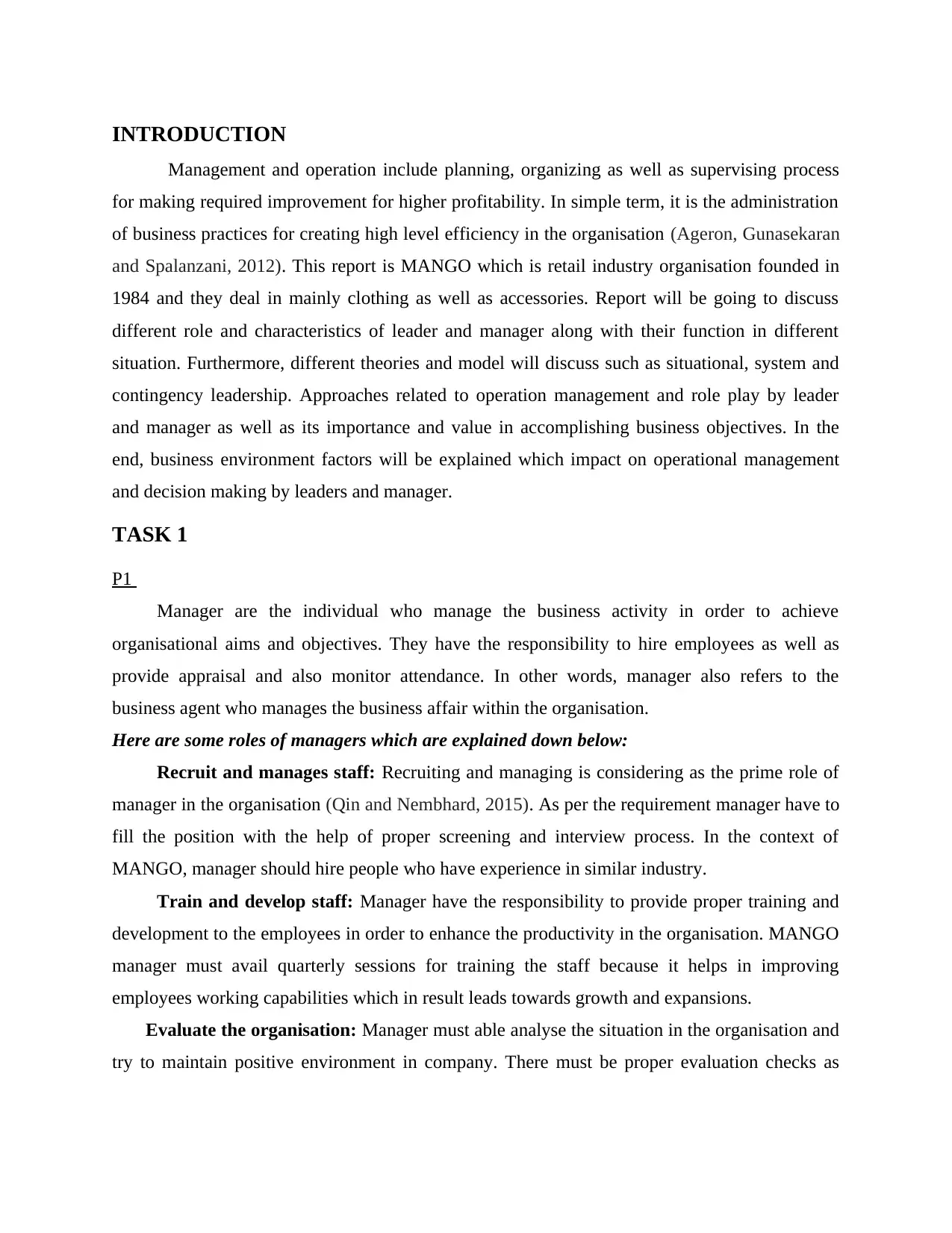
INTRODUCTION
Management and operation include planning, organizing as well as supervising process
for making required improvement for higher profitability. In simple term, it is the administration
of business practices for creating high level efficiency in the organisation (Ageron, Gunasekaran
and Spalanzani, 2012). This report is MANGO which is retail industry organisation founded in
1984 and they deal in mainly clothing as well as accessories. Report will be going to discuss
different role and characteristics of leader and manager along with their function in different
situation. Furthermore, different theories and model will discuss such as situational, system and
contingency leadership. Approaches related to operation management and role play by leader
and manager as well as its importance and value in accomplishing business objectives. In the
end, business environment factors will be explained which impact on operational management
and decision making by leaders and manager.
TASK 1
P1
Manager are the individual who manage the business activity in order to achieve
organisational aims and objectives. They have the responsibility to hire employees as well as
provide appraisal and also monitor attendance. In other words, manager also refers to the
business agent who manages the business affair within the organisation.
Here are some roles of managers which are explained down below:
Recruit and manages staff: Recruiting and managing is considering as the prime role of
manager in the organisation (Qin and Nembhard, 2015). As per the requirement manager have to
fill the position with the help of proper screening and interview process. In the context of
MANGO, manager should hire people who have experience in similar industry.
Train and develop staff: Manager have the responsibility to provide proper training and
development to the employees in order to enhance the productivity in the organisation. MANGO
manager must avail quarterly sessions for training the staff because it helps in improving
employees working capabilities which in result leads towards growth and expansions.
Evaluate the organisation: Manager must able analyse the situation in the organisation and
try to maintain positive environment in company. There must be proper evaluation checks as
Management and operation include planning, organizing as well as supervising process
for making required improvement for higher profitability. In simple term, it is the administration
of business practices for creating high level efficiency in the organisation (Ageron, Gunasekaran
and Spalanzani, 2012). This report is MANGO which is retail industry organisation founded in
1984 and they deal in mainly clothing as well as accessories. Report will be going to discuss
different role and characteristics of leader and manager along with their function in different
situation. Furthermore, different theories and model will discuss such as situational, system and
contingency leadership. Approaches related to operation management and role play by leader
and manager as well as its importance and value in accomplishing business objectives. In the
end, business environment factors will be explained which impact on operational management
and decision making by leaders and manager.
TASK 1
P1
Manager are the individual who manage the business activity in order to achieve
organisational aims and objectives. They have the responsibility to hire employees as well as
provide appraisal and also monitor attendance. In other words, manager also refers to the
business agent who manages the business affair within the organisation.
Here are some roles of managers which are explained down below:
Recruit and manages staff: Recruiting and managing is considering as the prime role of
manager in the organisation (Qin and Nembhard, 2015). As per the requirement manager have to
fill the position with the help of proper screening and interview process. In the context of
MANGO, manager should hire people who have experience in similar industry.
Train and develop staff: Manager have the responsibility to provide proper training and
development to the employees in order to enhance the productivity in the organisation. MANGO
manager must avail quarterly sessions for training the staff because it helps in improving
employees working capabilities which in result leads towards growth and expansions.
Evaluate the organisation: Manager must able analyse the situation in the organisation and
try to maintain positive environment in company. There must be proper evaluation checks as
⊘ This is a preview!⊘
Do you want full access?
Subscribe today to unlock all pages.

Trusted by 1+ million students worldwide
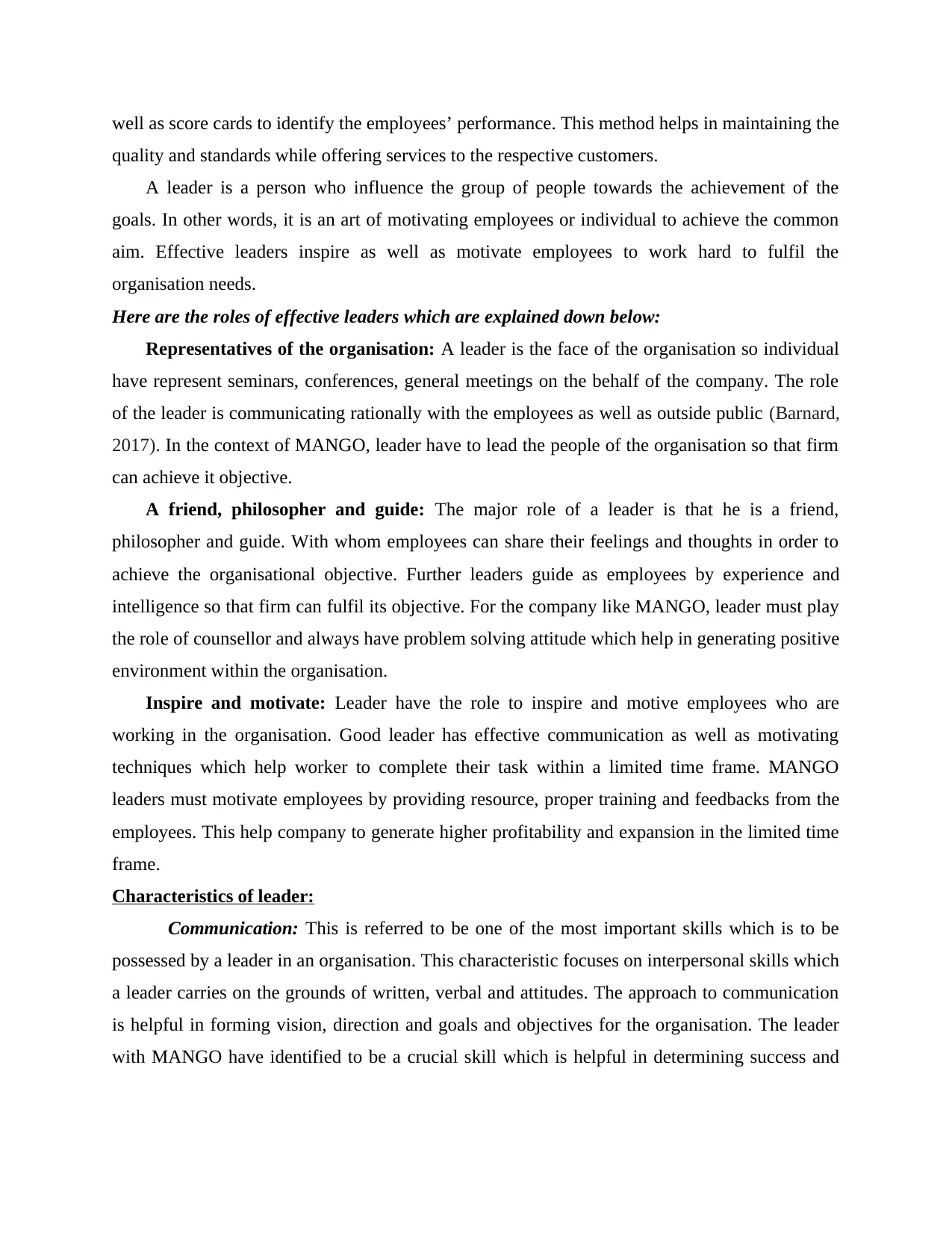
well as score cards to identify the employees’ performance. This method helps in maintaining the
quality and standards while offering services to the respective customers.
A leader is a person who influence the group of people towards the achievement of the
goals. In other words, it is an art of motivating employees or individual to achieve the common
aim. Effective leaders inspire as well as motivate employees to work hard to fulfil the
organisation needs.
Here are the roles of effective leaders which are explained down below:
Representatives of the organisation: A leader is the face of the organisation so individual
have represent seminars, conferences, general meetings on the behalf of the company. The role
of the leader is communicating rationally with the employees as well as outside public (Barnard,
2017). In the context of MANGO, leader have to lead the people of the organisation so that firm
can achieve it objective.
A friend, philosopher and guide: The major role of a leader is that he is a friend,
philosopher and guide. With whom employees can share their feelings and thoughts in order to
achieve the organisational objective. Further leaders guide as employees by experience and
intelligence so that firm can fulfil its objective. For the company like MANGO, leader must play
the role of counsellor and always have problem solving attitude which help in generating positive
environment within the organisation.
Inspire and motivate: Leader have the role to inspire and motive employees who are
working in the organisation. Good leader has effective communication as well as motivating
techniques which help worker to complete their task within a limited time frame. MANGO
leaders must motivate employees by providing resource, proper training and feedbacks from the
employees. This help company to generate higher profitability and expansion in the limited time
frame.
Characteristics of leader:
Communication: This is referred to be one of the most important skills which is to be
possessed by a leader in an organisation. This characteristic focuses on interpersonal skills which
a leader carries on the grounds of written, verbal and attitudes. The approach to communication
is helpful in forming vision, direction and goals and objectives for the organisation. The leader
with MANGO have identified to be a crucial skill which is helpful in determining success and
quality and standards while offering services to the respective customers.
A leader is a person who influence the group of people towards the achievement of the
goals. In other words, it is an art of motivating employees or individual to achieve the common
aim. Effective leaders inspire as well as motivate employees to work hard to fulfil the
organisation needs.
Here are the roles of effective leaders which are explained down below:
Representatives of the organisation: A leader is the face of the organisation so individual
have represent seminars, conferences, general meetings on the behalf of the company. The role
of the leader is communicating rationally with the employees as well as outside public (Barnard,
2017). In the context of MANGO, leader have to lead the people of the organisation so that firm
can achieve it objective.
A friend, philosopher and guide: The major role of a leader is that he is a friend,
philosopher and guide. With whom employees can share their feelings and thoughts in order to
achieve the organisational objective. Further leaders guide as employees by experience and
intelligence so that firm can fulfil its objective. For the company like MANGO, leader must play
the role of counsellor and always have problem solving attitude which help in generating positive
environment within the organisation.
Inspire and motivate: Leader have the role to inspire and motive employees who are
working in the organisation. Good leader has effective communication as well as motivating
techniques which help worker to complete their task within a limited time frame. MANGO
leaders must motivate employees by providing resource, proper training and feedbacks from the
employees. This help company to generate higher profitability and expansion in the limited time
frame.
Characteristics of leader:
Communication: This is referred to be one of the most important skills which is to be
possessed by a leader in an organisation. This characteristic focuses on interpersonal skills which
a leader carries on the grounds of written, verbal and attitudes. The approach to communication
is helpful in forming vision, direction and goals and objectives for the organisation. The leader
with MANGO have identified to be a crucial skill which is helpful in determining success and
Paraphrase This Document
Need a fresh take? Get an instant paraphrase of this document with our AI Paraphraser
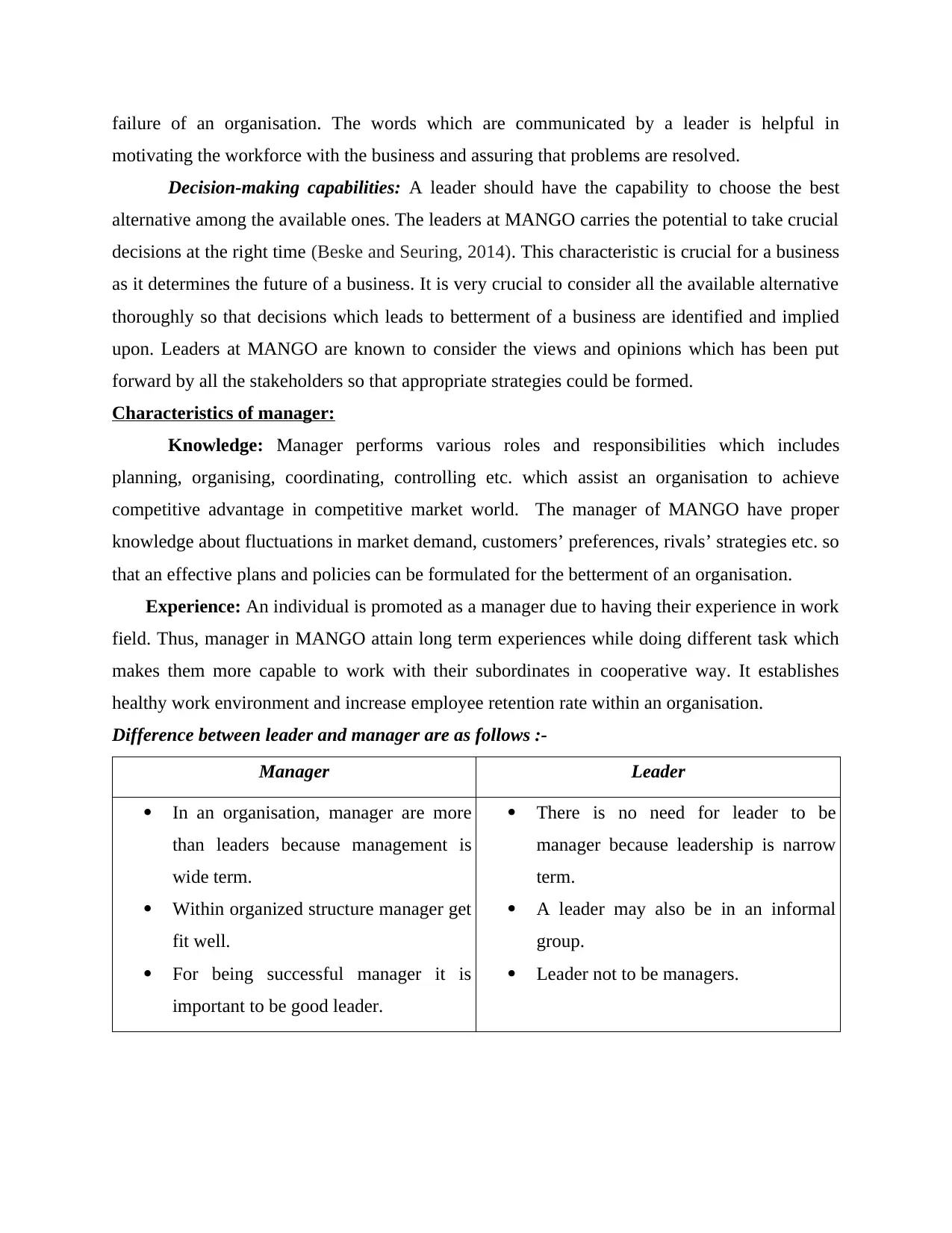
failure of an organisation. The words which are communicated by a leader is helpful in
motivating the workforce with the business and assuring that problems are resolved.
Decision-making capabilities: A leader should have the capability to choose the best
alternative among the available ones. The leaders at MANGO carries the potential to take crucial
decisions at the right time (Beske and Seuring, 2014). This characteristic is crucial for a business
as it determines the future of a business. It is very crucial to consider all the available alternative
thoroughly so that decisions which leads to betterment of a business are identified and implied
upon. Leaders at MANGO are known to consider the views and opinions which has been put
forward by all the stakeholders so that appropriate strategies could be formed.
Characteristics of manager:
Knowledge: Manager performs various roles and responsibilities which includes
planning, organising, coordinating, controlling etc. which assist an organisation to achieve
competitive advantage in competitive market world. The manager of MANGO have proper
knowledge about fluctuations in market demand, customers’ preferences, rivals’ strategies etc. so
that an effective plans and policies can be formulated for the betterment of an organisation.
Experience: An individual is promoted as a manager due to having their experience in work
field. Thus, manager in MANGO attain long term experiences while doing different task which
makes them more capable to work with their subordinates in cooperative way. It establishes
healthy work environment and increase employee retention rate within an organisation.
Difference between leader and manager are as follows :-
Manager Leader
In an organisation, manager are more
than leaders because management is
wide term.
Within organized structure manager get
fit well.
For being successful manager it is
important to be good leader.
There is no need for leader to be
manager because leadership is narrow
term.
A leader may also be in an informal
group.
Leader not to be managers.
motivating the workforce with the business and assuring that problems are resolved.
Decision-making capabilities: A leader should have the capability to choose the best
alternative among the available ones. The leaders at MANGO carries the potential to take crucial
decisions at the right time (Beske and Seuring, 2014). This characteristic is crucial for a business
as it determines the future of a business. It is very crucial to consider all the available alternative
thoroughly so that decisions which leads to betterment of a business are identified and implied
upon. Leaders at MANGO are known to consider the views and opinions which has been put
forward by all the stakeholders so that appropriate strategies could be formed.
Characteristics of manager:
Knowledge: Manager performs various roles and responsibilities which includes
planning, organising, coordinating, controlling etc. which assist an organisation to achieve
competitive advantage in competitive market world. The manager of MANGO have proper
knowledge about fluctuations in market demand, customers’ preferences, rivals’ strategies etc. so
that an effective plans and policies can be formulated for the betterment of an organisation.
Experience: An individual is promoted as a manager due to having their experience in work
field. Thus, manager in MANGO attain long term experiences while doing different task which
makes them more capable to work with their subordinates in cooperative way. It establishes
healthy work environment and increase employee retention rate within an organisation.
Difference between leader and manager are as follows :-
Manager Leader
In an organisation, manager are more
than leaders because management is
wide term.
Within organized structure manager get
fit well.
For being successful manager it is
important to be good leader.
There is no need for leader to be
manager because leadership is narrow
term.
A leader may also be in an informal
group.
Leader not to be managers.
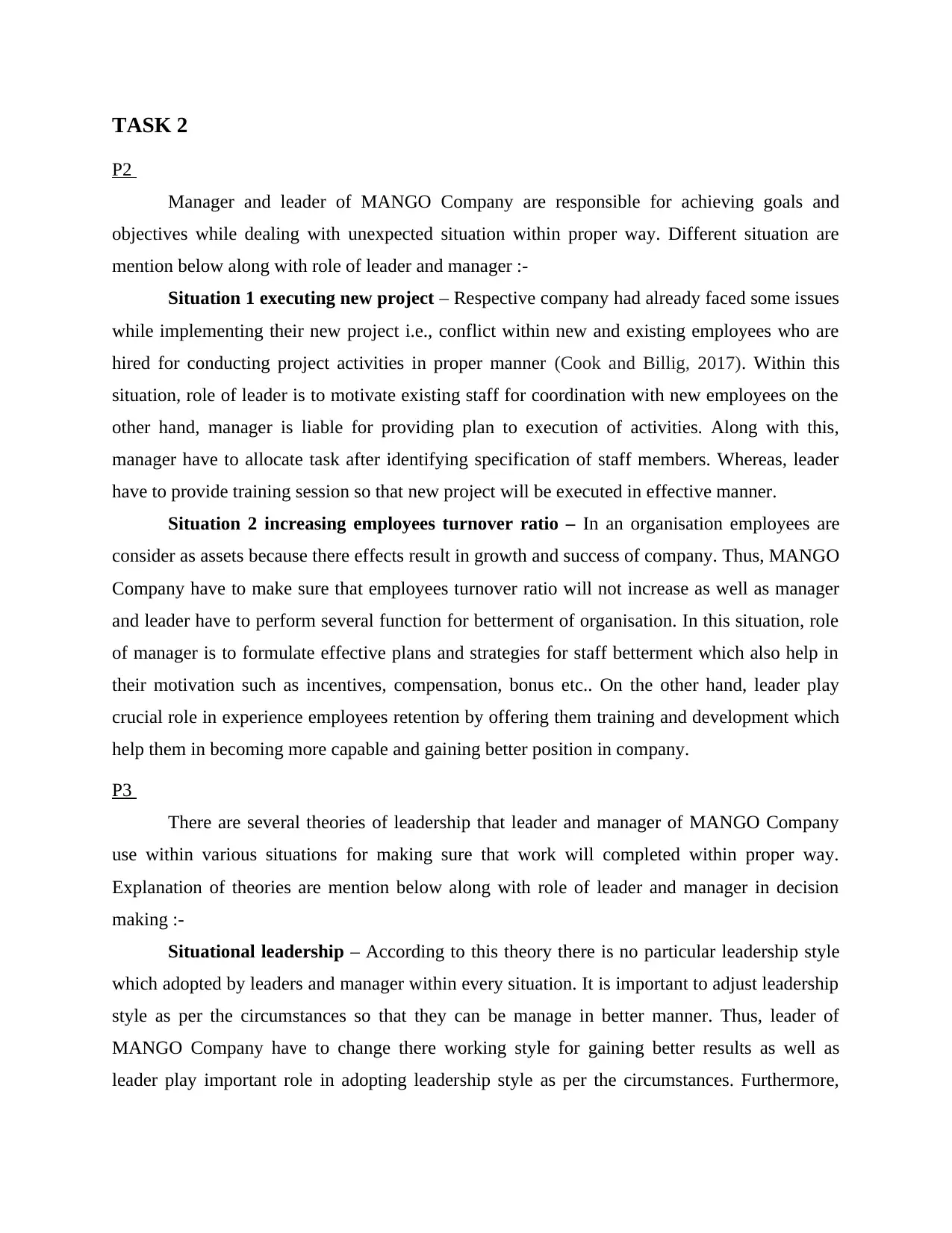
TASK 2
P2
Manager and leader of MANGO Company are responsible for achieving goals and
objectives while dealing with unexpected situation within proper way. Different situation are
mention below along with role of leader and manager :-
Situation 1 executing new project – Respective company had already faced some issues
while implementing their new project i.e., conflict within new and existing employees who are
hired for conducting project activities in proper manner (Cook and Billig, 2017). Within this
situation, role of leader is to motivate existing staff for coordination with new employees on the
other hand, manager is liable for providing plan to execution of activities. Along with this,
manager have to allocate task after identifying specification of staff members. Whereas, leader
have to provide training session so that new project will be executed in effective manner.
Situation 2 increasing employees turnover ratio – In an organisation employees are
consider as assets because there effects result in growth and success of company. Thus, MANGO
Company have to make sure that employees turnover ratio will not increase as well as manager
and leader have to perform several function for betterment of organisation. In this situation, role
of manager is to formulate effective plans and strategies for staff betterment which also help in
their motivation such as incentives, compensation, bonus etc.. On the other hand, leader play
crucial role in experience employees retention by offering them training and development which
help them in becoming more capable and gaining better position in company.
P3
There are several theories of leadership that leader and manager of MANGO Company
use within various situations for making sure that work will completed within proper way.
Explanation of theories are mention below along with role of leader and manager in decision
making :-
Situational leadership – According to this theory there is no particular leadership style
which adopted by leaders and manager within every situation. It is important to adjust leadership
style as per the circumstances so that they can be manage in better manner. Thus, leader of
MANGO Company have to change there working style for gaining better results as well as
leader play important role in adopting leadership style as per the circumstances. Furthermore,
P2
Manager and leader of MANGO Company are responsible for achieving goals and
objectives while dealing with unexpected situation within proper way. Different situation are
mention below along with role of leader and manager :-
Situation 1 executing new project – Respective company had already faced some issues
while implementing their new project i.e., conflict within new and existing employees who are
hired for conducting project activities in proper manner (Cook and Billig, 2017). Within this
situation, role of leader is to motivate existing staff for coordination with new employees on the
other hand, manager is liable for providing plan to execution of activities. Along with this,
manager have to allocate task after identifying specification of staff members. Whereas, leader
have to provide training session so that new project will be executed in effective manner.
Situation 2 increasing employees turnover ratio – In an organisation employees are
consider as assets because there effects result in growth and success of company. Thus, MANGO
Company have to make sure that employees turnover ratio will not increase as well as manager
and leader have to perform several function for betterment of organisation. In this situation, role
of manager is to formulate effective plans and strategies for staff betterment which also help in
their motivation such as incentives, compensation, bonus etc.. On the other hand, leader play
crucial role in experience employees retention by offering them training and development which
help them in becoming more capable and gaining better position in company.
P3
There are several theories of leadership that leader and manager of MANGO Company
use within various situations for making sure that work will completed within proper way.
Explanation of theories are mention below along with role of leader and manager in decision
making :-
Situational leadership – According to this theory there is no particular leadership style
which adopted by leaders and manager within every situation. It is important to adjust leadership
style as per the circumstances so that they can be manage in better manner. Thus, leader of
MANGO Company have to change there working style for gaining better results as well as
leader play important role in adopting leadership style as per the circumstances. Furthermore,
⊘ This is a preview!⊘
Do you want full access?
Subscribe today to unlock all pages.

Trusted by 1+ million students worldwide
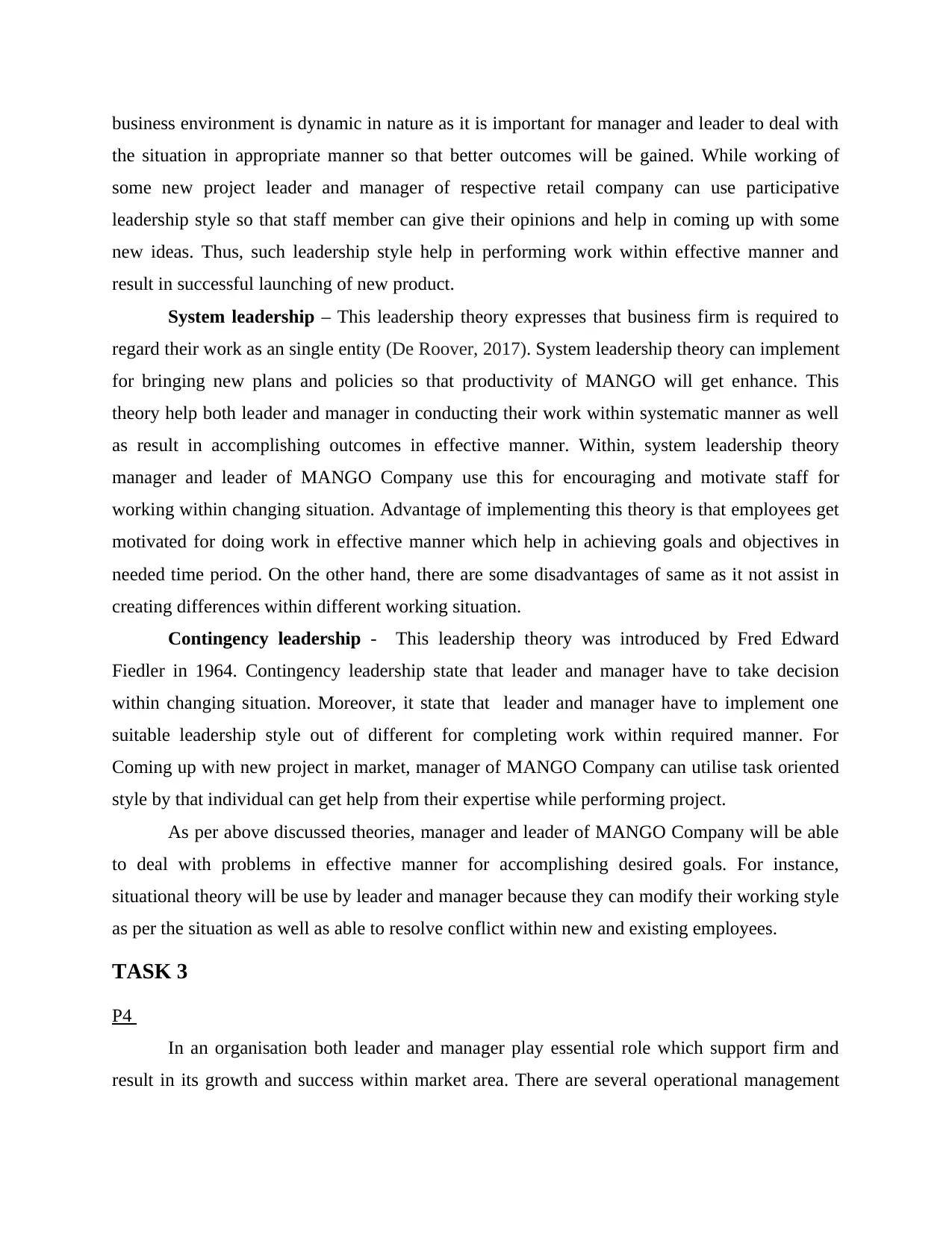
business environment is dynamic in nature as it is important for manager and leader to deal with
the situation in appropriate manner so that better outcomes will be gained. While working of
some new project leader and manager of respective retail company can use participative
leadership style so that staff member can give their opinions and help in coming up with some
new ideas. Thus, such leadership style help in performing work within effective manner and
result in successful launching of new product.
System leadership – This leadership theory expresses that business firm is required to
regard their work as an single entity (De Roover, 2017). System leadership theory can implement
for bringing new plans and policies so that productivity of MANGO will get enhance. This
theory help both leader and manager in conducting their work within systematic manner as well
as result in accomplishing outcomes in effective manner. Within, system leadership theory
manager and leader of MANGO Company use this for encouraging and motivate staff for
working within changing situation. Advantage of implementing this theory is that employees get
motivated for doing work in effective manner which help in achieving goals and objectives in
needed time period. On the other hand, there are some disadvantages of same as it not assist in
creating differences within different working situation.
Contingency leadership - This leadership theory was introduced by Fred Edward
Fiedler in 1964. Contingency leadership state that leader and manager have to take decision
within changing situation. Moreover, it state that leader and manager have to implement one
suitable leadership style out of different for completing work within required manner. For
Coming up with new project in market, manager of MANGO Company can utilise task oriented
style by that individual can get help from their expertise while performing project.
As per above discussed theories, manager and leader of MANGO Company will be able
to deal with problems in effective manner for accomplishing desired goals. For instance,
situational theory will be use by leader and manager because they can modify their working style
as per the situation as well as able to resolve conflict within new and existing employees.
TASK 3
P4
In an organisation both leader and manager play essential role which support firm and
result in its growth and success within market area. There are several operational management
the situation in appropriate manner so that better outcomes will be gained. While working of
some new project leader and manager of respective retail company can use participative
leadership style so that staff member can give their opinions and help in coming up with some
new ideas. Thus, such leadership style help in performing work within effective manner and
result in successful launching of new product.
System leadership – This leadership theory expresses that business firm is required to
regard their work as an single entity (De Roover, 2017). System leadership theory can implement
for bringing new plans and policies so that productivity of MANGO will get enhance. This
theory help both leader and manager in conducting their work within systematic manner as well
as result in accomplishing outcomes in effective manner. Within, system leadership theory
manager and leader of MANGO Company use this for encouraging and motivate staff for
working within changing situation. Advantage of implementing this theory is that employees get
motivated for doing work in effective manner which help in achieving goals and objectives in
needed time period. On the other hand, there are some disadvantages of same as it not assist in
creating differences within different working situation.
Contingency leadership - This leadership theory was introduced by Fred Edward
Fiedler in 1964. Contingency leadership state that leader and manager have to take decision
within changing situation. Moreover, it state that leader and manager have to implement one
suitable leadership style out of different for completing work within required manner. For
Coming up with new project in market, manager of MANGO Company can utilise task oriented
style by that individual can get help from their expertise while performing project.
As per above discussed theories, manager and leader of MANGO Company will be able
to deal with problems in effective manner for accomplishing desired goals. For instance,
situational theory will be use by leader and manager because they can modify their working style
as per the situation as well as able to resolve conflict within new and existing employees.
TASK 3
P4
In an organisation both leader and manager play essential role which support firm and
result in its growth and success within market area. There are several operational management
Paraphrase This Document
Need a fresh take? Get an instant paraphrase of this document with our AI Paraphraser
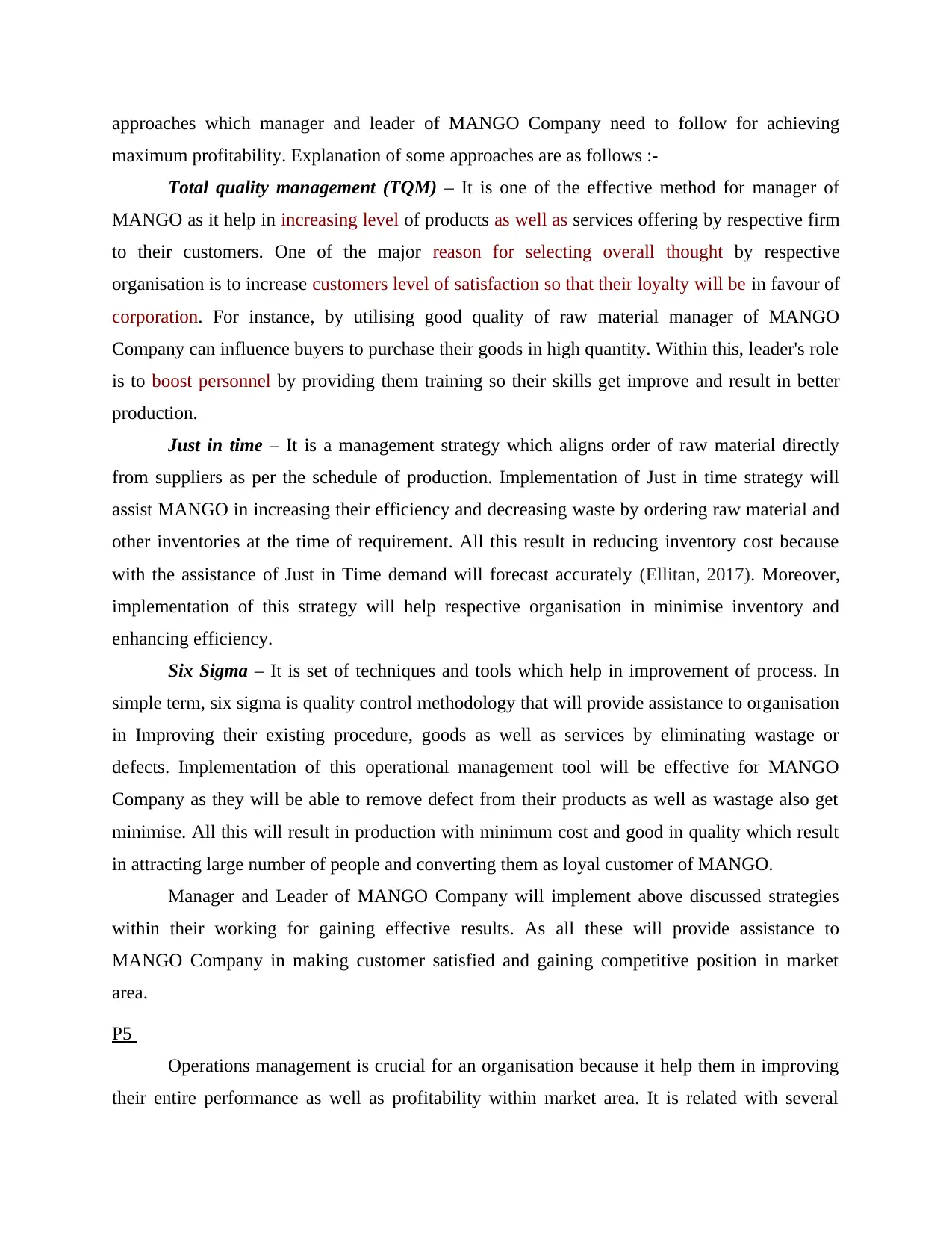
approaches which manager and leader of MANGO Company need to follow for achieving
maximum profitability. Explanation of some approaches are as follows :-
Total quality management (TQM) – It is one of the effective method for manager of
MANGO as it help in increasing level of products as well as services offering by respective firm
to their customers. One of the major reason for selecting overall thought by respective
organisation is to increase customers level of satisfaction so that their loyalty will be in favour of
corporation. For instance, by utilising good quality of raw material manager of MANGO
Company can influence buyers to purchase their goods in high quantity. Within this, leader's role
is to boost personnel by providing them training so their skills get improve and result in better
production.
Just in time – It is a management strategy which aligns order of raw material directly
from suppliers as per the schedule of production. Implementation of Just in time strategy will
assist MANGO in increasing their efficiency and decreasing waste by ordering raw material and
other inventories at the time of requirement. All this result in reducing inventory cost because
with the assistance of Just in Time demand will forecast accurately (Ellitan, 2017). Moreover,
implementation of this strategy will help respective organisation in minimise inventory and
enhancing efficiency.
Six Sigma – It is set of techniques and tools which help in improvement of process. In
simple term, six sigma is quality control methodology that will provide assistance to organisation
in Improving their existing procedure, goods as well as services by eliminating wastage or
defects. Implementation of this operational management tool will be effective for MANGO
Company as they will be able to remove defect from their products as well as wastage also get
minimise. All this will result in production with minimum cost and good in quality which result
in attracting large number of people and converting them as loyal customer of MANGO.
Manager and Leader of MANGO Company will implement above discussed strategies
within their working for gaining effective results. As all these will provide assistance to
MANGO Company in making customer satisfied and gaining competitive position in market
area.
P5
Operations management is crucial for an organisation because it help them in improving
their entire performance as well as profitability within market area. It is related with several
maximum profitability. Explanation of some approaches are as follows :-
Total quality management (TQM) – It is one of the effective method for manager of
MANGO as it help in increasing level of products as well as services offering by respective firm
to their customers. One of the major reason for selecting overall thought by respective
organisation is to increase customers level of satisfaction so that their loyalty will be in favour of
corporation. For instance, by utilising good quality of raw material manager of MANGO
Company can influence buyers to purchase their goods in high quantity. Within this, leader's role
is to boost personnel by providing them training so their skills get improve and result in better
production.
Just in time – It is a management strategy which aligns order of raw material directly
from suppliers as per the schedule of production. Implementation of Just in time strategy will
assist MANGO in increasing their efficiency and decreasing waste by ordering raw material and
other inventories at the time of requirement. All this result in reducing inventory cost because
with the assistance of Just in Time demand will forecast accurately (Ellitan, 2017). Moreover,
implementation of this strategy will help respective organisation in minimise inventory and
enhancing efficiency.
Six Sigma – It is set of techniques and tools which help in improvement of process. In
simple term, six sigma is quality control methodology that will provide assistance to organisation
in Improving their existing procedure, goods as well as services by eliminating wastage or
defects. Implementation of this operational management tool will be effective for MANGO
Company as they will be able to remove defect from their products as well as wastage also get
minimise. All this will result in production with minimum cost and good in quality which result
in attracting large number of people and converting them as loyal customer of MANGO.
Manager and Leader of MANGO Company will implement above discussed strategies
within their working for gaining effective results. As all these will provide assistance to
MANGO Company in making customer satisfied and gaining competitive position in market
area.
P5
Operations management is crucial for an organisation because it help them in improving
their entire performance as well as profitability within market area. It is related with several
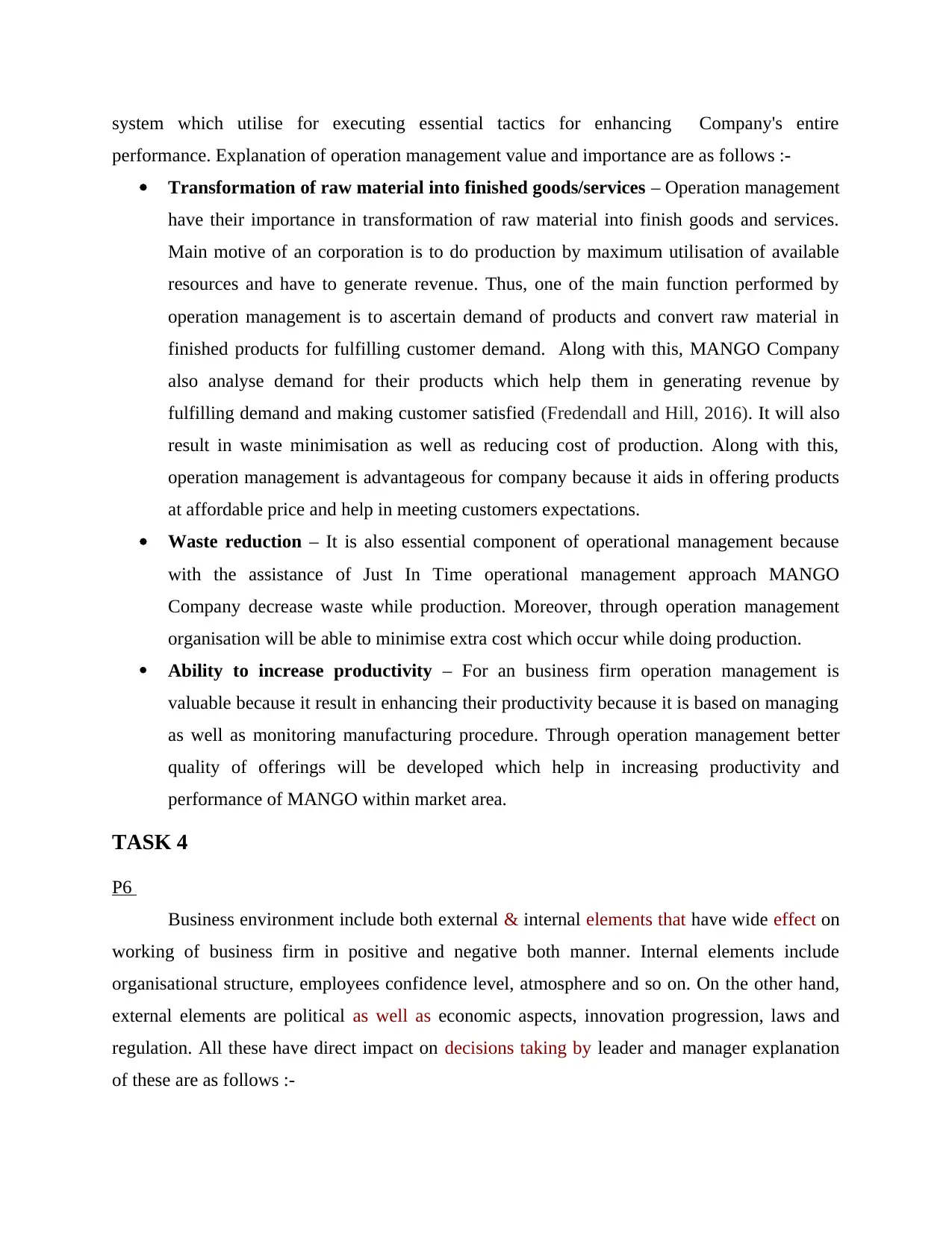
system which utilise for executing essential tactics for enhancing Company's entire
performance. Explanation of operation management value and importance are as follows :-
Transformation of raw material into finished goods/services – Operation management
have their importance in transformation of raw material into finish goods and services.
Main motive of an corporation is to do production by maximum utilisation of available
resources and have to generate revenue. Thus, one of the main function performed by
operation management is to ascertain demand of products and convert raw material in
finished products for fulfilling customer demand. Along with this, MANGO Company
also analyse demand for their products which help them in generating revenue by
fulfilling demand and making customer satisfied (Fredendall and Hill, 2016). It will also
result in waste minimisation as well as reducing cost of production. Along with this,
operation management is advantageous for company because it aids in offering products
at affordable price and help in meeting customers expectations.
Waste reduction – It is also essential component of operational management because
with the assistance of Just In Time operational management approach MANGO
Company decrease waste while production. Moreover, through operation management
organisation will be able to minimise extra cost which occur while doing production.
Ability to increase productivity – For an business firm operation management is
valuable because it result in enhancing their productivity because it is based on managing
as well as monitoring manufacturing procedure. Through operation management better
quality of offerings will be developed which help in increasing productivity and
performance of MANGO within market area.
TASK 4
P6
Business environment include both external & internal elements that have wide effect on
working of business firm in positive and negative both manner. Internal elements include
organisational structure, employees confidence level, atmosphere and so on. On the other hand,
external elements are political as well as economic aspects, innovation progression, laws and
regulation. All these have direct impact on decisions taking by leader and manager explanation
of these are as follows :-
performance. Explanation of operation management value and importance are as follows :-
Transformation of raw material into finished goods/services – Operation management
have their importance in transformation of raw material into finish goods and services.
Main motive of an corporation is to do production by maximum utilisation of available
resources and have to generate revenue. Thus, one of the main function performed by
operation management is to ascertain demand of products and convert raw material in
finished products for fulfilling customer demand. Along with this, MANGO Company
also analyse demand for their products which help them in generating revenue by
fulfilling demand and making customer satisfied (Fredendall and Hill, 2016). It will also
result in waste minimisation as well as reducing cost of production. Along with this,
operation management is advantageous for company because it aids in offering products
at affordable price and help in meeting customers expectations.
Waste reduction – It is also essential component of operational management because
with the assistance of Just In Time operational management approach MANGO
Company decrease waste while production. Moreover, through operation management
organisation will be able to minimise extra cost which occur while doing production.
Ability to increase productivity – For an business firm operation management is
valuable because it result in enhancing their productivity because it is based on managing
as well as monitoring manufacturing procedure. Through operation management better
quality of offerings will be developed which help in increasing productivity and
performance of MANGO within market area.
TASK 4
P6
Business environment include both external & internal elements that have wide effect on
working of business firm in positive and negative both manner. Internal elements include
organisational structure, employees confidence level, atmosphere and so on. On the other hand,
external elements are political as well as economic aspects, innovation progression, laws and
regulation. All these have direct impact on decisions taking by leader and manager explanation
of these are as follows :-
⊘ This is a preview!⊘
Do you want full access?
Subscribe today to unlock all pages.

Trusted by 1+ million students worldwide
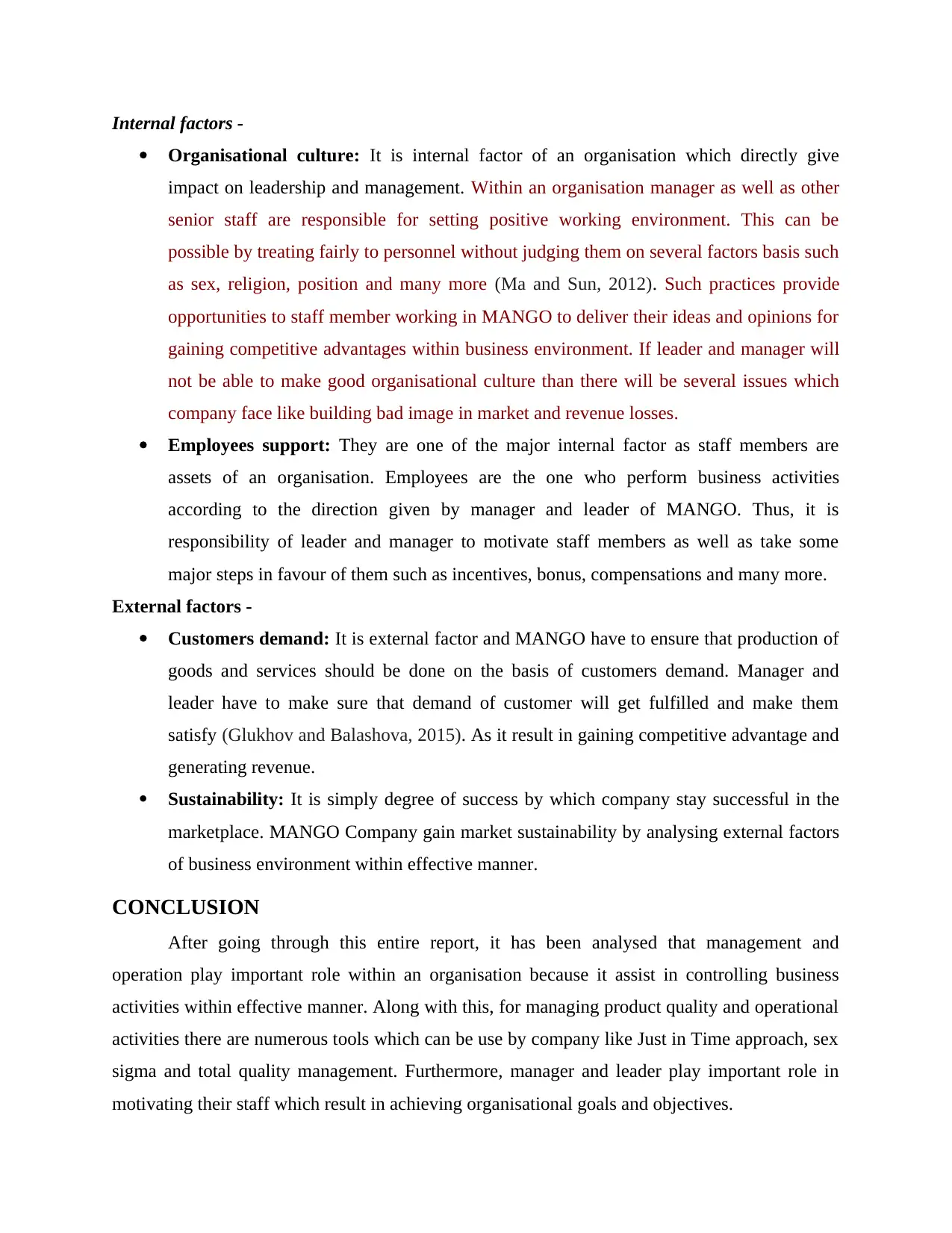
Internal factors -
Organisational culture: It is internal factor of an organisation which directly give
impact on leadership and management. Within an organisation manager as well as other
senior staff are responsible for setting positive working environment. This can be
possible by treating fairly to personnel without judging them on several factors basis such
as sex, religion, position and many more (Ma and Sun, 2012). Such practices provide
opportunities to staff member working in MANGO to deliver their ideas and opinions for
gaining competitive advantages within business environment. If leader and manager will
not be able to make good organisational culture than there will be several issues which
company face like building bad image in market and revenue losses.
Employees support: They are one of the major internal factor as staff members are
assets of an organisation. Employees are the one who perform business activities
according to the direction given by manager and leader of MANGO. Thus, it is
responsibility of leader and manager to motivate staff members as well as take some
major steps in favour of them such as incentives, bonus, compensations and many more.
External factors -
Customers demand: It is external factor and MANGO have to ensure that production of
goods and services should be done on the basis of customers demand. Manager and
leader have to make sure that demand of customer will get fulfilled and make them
satisfy (Glukhov and Balashova, 2015). As it result in gaining competitive advantage and
generating revenue.
Sustainability: It is simply degree of success by which company stay successful in the
marketplace. MANGO Company gain market sustainability by analysing external factors
of business environment within effective manner.
CONCLUSION
After going through this entire report, it has been analysed that management and
operation play important role within an organisation because it assist in controlling business
activities within effective manner. Along with this, for managing product quality and operational
activities there are numerous tools which can be use by company like Just in Time approach, sex
sigma and total quality management. Furthermore, manager and leader play important role in
motivating their staff which result in achieving organisational goals and objectives.
Organisational culture: It is internal factor of an organisation which directly give
impact on leadership and management. Within an organisation manager as well as other
senior staff are responsible for setting positive working environment. This can be
possible by treating fairly to personnel without judging them on several factors basis such
as sex, religion, position and many more (Ma and Sun, 2012). Such practices provide
opportunities to staff member working in MANGO to deliver their ideas and opinions for
gaining competitive advantages within business environment. If leader and manager will
not be able to make good organisational culture than there will be several issues which
company face like building bad image in market and revenue losses.
Employees support: They are one of the major internal factor as staff members are
assets of an organisation. Employees are the one who perform business activities
according to the direction given by manager and leader of MANGO. Thus, it is
responsibility of leader and manager to motivate staff members as well as take some
major steps in favour of them such as incentives, bonus, compensations and many more.
External factors -
Customers demand: It is external factor and MANGO have to ensure that production of
goods and services should be done on the basis of customers demand. Manager and
leader have to make sure that demand of customer will get fulfilled and make them
satisfy (Glukhov and Balashova, 2015). As it result in gaining competitive advantage and
generating revenue.
Sustainability: It is simply degree of success by which company stay successful in the
marketplace. MANGO Company gain market sustainability by analysing external factors
of business environment within effective manner.
CONCLUSION
After going through this entire report, it has been analysed that management and
operation play important role within an organisation because it assist in controlling business
activities within effective manner. Along with this, for managing product quality and operational
activities there are numerous tools which can be use by company like Just in Time approach, sex
sigma and total quality management. Furthermore, manager and leader play important role in
motivating their staff which result in achieving organisational goals and objectives.
Paraphrase This Document
Need a fresh take? Get an instant paraphrase of this document with our AI Paraphraser

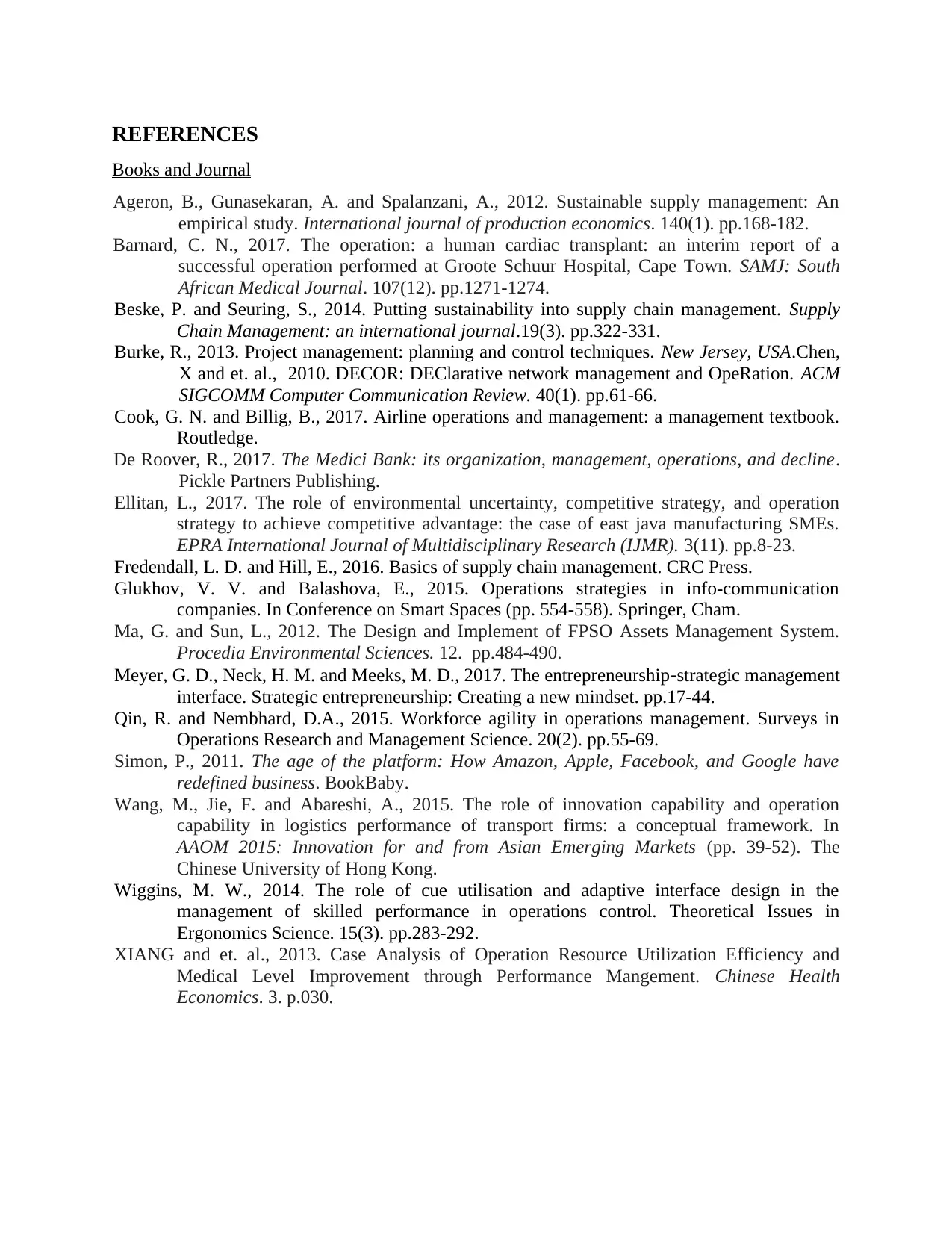
REFERENCES
Books and Journal
Ageron, B., Gunasekaran, A. and Spalanzani, A., 2012. Sustainable supply management: An
empirical study. International journal of production economics. 140(1). pp.168-182.
Barnard, C. N., 2017. The operation: a human cardiac transplant: an interim report of a
successful operation performed at Groote Schuur Hospital, Cape Town. SAMJ: South
African Medical Journal. 107(12). pp.1271-1274.
Beske, P. and Seuring, S., 2014. Putting sustainability into supply chain management. Supply
Chain Management: an international journal.19(3). pp.322-331.
Burke, R., 2013. Project management: planning and control techniques. New Jersey, USA.Chen,
X and et. al., 2010. DECOR: DEClarative network management and OpeRation. ACM
SIGCOMM Computer Communication Review. 40(1). pp.61-66.
Cook, G. N. and Billig, B., 2017. Airline operations and management: a management textbook.
Routledge.
De Roover, R., 2017. The Medici Bank: its organization, management, operations, and decline.
Pickle Partners Publishing.
Ellitan, L., 2017. The role of environmental uncertainty, competitive strategy, and operation
strategy to achieve competitive advantage: the case of east java manufacturing SMEs.
EPRA International Journal of Multidisciplinary Research (IJMR). 3(11). pp.8-23.
Fredendall, L. D. and Hill, E., 2016. Basics of supply chain management. CRC Press.
Glukhov, V. V. and Balashova, E., 2015. Operations strategies in info-communication
companies. In Conference on Smart Spaces (pp. 554-558). Springer, Cham.
Ma, G. and Sun, L., 2012. The Design and Implement of FPSO Assets Management System.
Procedia Environmental Sciences. 12. pp.484-490.
Meyer, G. D., Neck, H. M. and Meeks, M. D., 2017. The entrepreneurship‐strategic management
interface. Strategic entrepreneurship: Creating a new mindset. pp.17-44.
Qin, R. and Nembhard, D.A., 2015. Workforce agility in operations management. Surveys in
Operations Research and Management Science. 20(2). pp.55-69.
Simon, P., 2011. The age of the platform: How Amazon, Apple, Facebook, and Google have
redefined business. BookBaby.
Wang, M., Jie, F. and Abareshi, A., 2015. The role of innovation capability and operation
capability in logistics performance of transport firms: a conceptual framework. In
AAOM 2015: Innovation for and from Asian Emerging Markets (pp. 39-52). The
Chinese University of Hong Kong.
Wiggins, M. W., 2014. The role of cue utilisation and adaptive interface design in the
management of skilled performance in operations control. Theoretical Issues in
Ergonomics Science. 15(3). pp.283-292.
XIANG and et. al., 2013. Case Analysis of Operation Resource Utilization Efficiency and
Medical Level Improvement through Performance Mangement. Chinese Health
Economics. 3. p.030.
Books and Journal
Ageron, B., Gunasekaran, A. and Spalanzani, A., 2012. Sustainable supply management: An
empirical study. International journal of production economics. 140(1). pp.168-182.
Barnard, C. N., 2017. The operation: a human cardiac transplant: an interim report of a
successful operation performed at Groote Schuur Hospital, Cape Town. SAMJ: South
African Medical Journal. 107(12). pp.1271-1274.
Beske, P. and Seuring, S., 2014. Putting sustainability into supply chain management. Supply
Chain Management: an international journal.19(3). pp.322-331.
Burke, R., 2013. Project management: planning and control techniques. New Jersey, USA.Chen,
X and et. al., 2010. DECOR: DEClarative network management and OpeRation. ACM
SIGCOMM Computer Communication Review. 40(1). pp.61-66.
Cook, G. N. and Billig, B., 2017. Airline operations and management: a management textbook.
Routledge.
De Roover, R., 2017. The Medici Bank: its organization, management, operations, and decline.
Pickle Partners Publishing.
Ellitan, L., 2017. The role of environmental uncertainty, competitive strategy, and operation
strategy to achieve competitive advantage: the case of east java manufacturing SMEs.
EPRA International Journal of Multidisciplinary Research (IJMR). 3(11). pp.8-23.
Fredendall, L. D. and Hill, E., 2016. Basics of supply chain management. CRC Press.
Glukhov, V. V. and Balashova, E., 2015. Operations strategies in info-communication
companies. In Conference on Smart Spaces (pp. 554-558). Springer, Cham.
Ma, G. and Sun, L., 2012. The Design and Implement of FPSO Assets Management System.
Procedia Environmental Sciences. 12. pp.484-490.
Meyer, G. D., Neck, H. M. and Meeks, M. D., 2017. The entrepreneurship‐strategic management
interface. Strategic entrepreneurship: Creating a new mindset. pp.17-44.
Qin, R. and Nembhard, D.A., 2015. Workforce agility in operations management. Surveys in
Operations Research and Management Science. 20(2). pp.55-69.
Simon, P., 2011. The age of the platform: How Amazon, Apple, Facebook, and Google have
redefined business. BookBaby.
Wang, M., Jie, F. and Abareshi, A., 2015. The role of innovation capability and operation
capability in logistics performance of transport firms: a conceptual framework. In
AAOM 2015: Innovation for and from Asian Emerging Markets (pp. 39-52). The
Chinese University of Hong Kong.
Wiggins, M. W., 2014. The role of cue utilisation and adaptive interface design in the
management of skilled performance in operations control. Theoretical Issues in
Ergonomics Science. 15(3). pp.283-292.
XIANG and et. al., 2013. Case Analysis of Operation Resource Utilization Efficiency and
Medical Level Improvement through Performance Mangement. Chinese Health
Economics. 3. p.030.
⊘ This is a preview!⊘
Do you want full access?
Subscribe today to unlock all pages.

Trusted by 1+ million students worldwide
1 out of 14
Related Documents
Your All-in-One AI-Powered Toolkit for Academic Success.
+13062052269
info@desklib.com
Available 24*7 on WhatsApp / Email
![[object Object]](/_next/static/media/star-bottom.7253800d.svg)
Unlock your academic potential
Copyright © 2020–2025 A2Z Services. All Rights Reserved. Developed and managed by ZUCOL.





